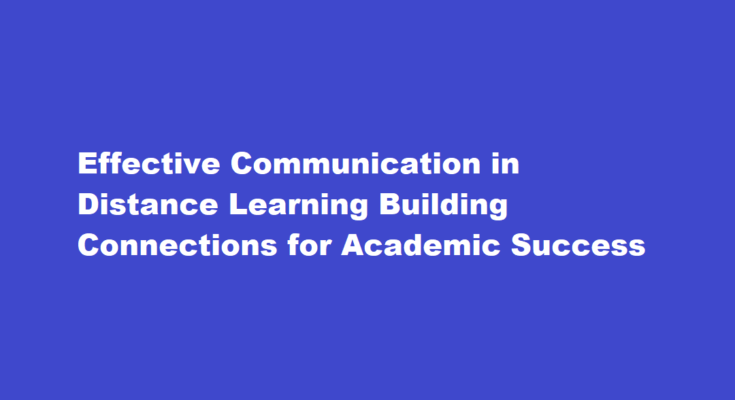Introduction
Effective communication is the cornerstone of successful distance learning. As the virtual classroom becomes the new norm, the ability to communicate clearly and meaningfully with instructors and peers is vital for academic achievement. In this article, we will explore essential strategies to engage in effective communication during distance learning, fostering connections that lead to a more enriching and rewarding learning experience.
Practice Online Etiquette
In the virtual world, practicing proper online etiquette is crucial for building a positive and respectful learning environment. Use appropriate language and tone in your messages, discussions, and emails. Avoid using all capital letters (which can be perceived as shouting) and be mindful of cultural sensitivities. Treat your virtual interactions as you would in a face-to-face setting, fostering a sense of professionalism and respect.
Be Active and Responsive
Engage actively in virtual discussions, forums, and group activities. Participate by sharing your ideas, asking questions, and responding to your peers’ contributions. Being responsive shows your commitment to the learning community and encourages others to engage with you in return.
Utilize Clear and Concise Language
In written communication, use clear and concise language to convey your thoughts effectively. Avoid jargon or overly complex language that may hinder understanding. Ensure your messages are coherent and easy to follow, promoting a productive exchange of ideas.
Use Video Conferencing Effectively
When engaging in video conferences or virtual meetings, ensure your audio and video settings are functioning correctly. Practice good video conferencing etiquette, such as being on time, dressing appropriately, and minimizing background noise. Maintain eye contact by looking at the camera when speaking, fostering a sense of connection with your audience.
Seek Clarification When Needed
If you encounter unclear instructions or have questions about the course material, don’t hesitate to seek clarification from your instructors. Effective communication includes being proactive in resolving any doubts, as this will help you stay on track and ensure a deeper understanding of the subject matter.
Be Respectful of Time Zones
In distance learning, you may interact with classmates and instructors from different time zones. Be mindful of these time differences when scheduling meetings or responding to messages. Use tools that allow you to schedule events in multiple time zones to avoid misunderstandings and accommodate everyone’s availability.
Practice Active Listening
Effective communication involves active listening. When participating in virtual discussions or listening to lectures, focus your attention on the speaker or the topic being discussed. Take notes, ask questions, and engage in the conversation to show your attentiveness and understanding.
Use Collaborative Tools
Take advantage of collaborative tools and platforms provided by your learning institution. These tools can include discussion boards, shared documents, and online study groups. Collaborative platforms facilitate group work and enhance communication with peers, promoting a sense of camaraderie in the virtual learning environment.
Seek and Provide Constructive Feedback
Offering and receiving feedback is a valuable aspect of effective communication in distance learning. When providing feedback to peers, be constructive and supportive. When receiving feedback, be open-minded and use it as an opportunity for growth and improvement.
Conclusion
Effective communication is the key to building meaningful connections and succeeding in distance learning. By practicing online etiquette, being active and responsive, using clear language, and utilizing collaborative tools, you can foster a positive and engaging learning environment. Embrace the opportunities for communication in the virtual classroom, and you will find that effective communication enriches your learning experience and contributes to your academic success.
Frequently Asked Questions
How can I ensure effective communication with my instructors in distance learning?
To communicate effectively with instructors, be proactive in seeking clarification when needed, use clear and concise language, and demonstrate respect for their time. Utilize designated communication channels, such as email or virtual office hours, to reach out with questions or concerns.
How can I engage in meaningful discussions with my peers in distance learning?
Actively participate in online discussions, share your ideas, ask questions, and respond to your peers’ contributions. Be respectful and considerate in your interactions, promoting a collaborative and inclusive learning environment.
What should I do if I encounter technical issues during virtual meetings or discussions?
If you experience technical issues, notify the relevant parties promptly. Troubleshoot the problem by checking your internet connection, restarting your device, or using an alternative communication method if necessary. Seek assistance from technical support if the issue persists.
Read Also : Effective Time Management in Distance Learning Strategies for Maximizing Productivity



